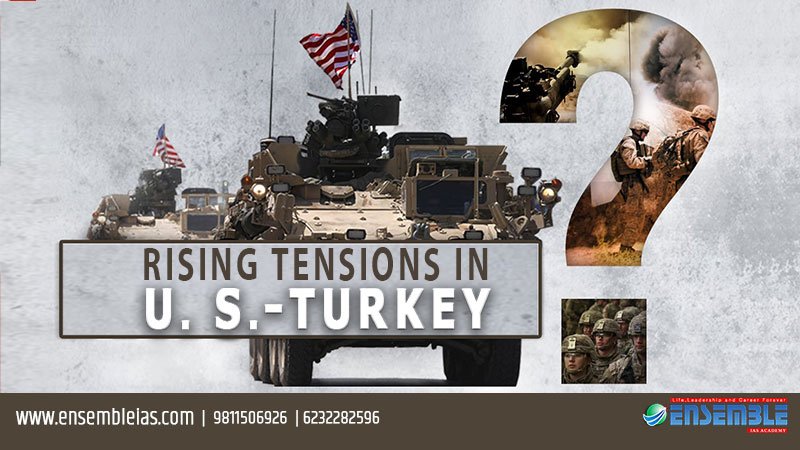U.S.-Turkey Relations: The downturn in Turkey’s relations with the U.S. holds implications for the future of NATO
Rising tensions in U.S.-Turkey Relations are threatening to upset North Atlantic Treaty Organisation (NATO) unity. In the latest of a series of incidents, Turkish President Recep Tayyip Erdoğan has threatened to shut down two U.S. bases in retaliation for the proposed American sanctions on Ankara over purchasing Russian weapons. The U.S. and Turkey are the largest and second largest standing armies of NATO, respectively.
There are U.S. nuclear warheads in the Incirlik airb̥ase, a critical facility for American operations in West Asia. Mr. Erdogan has warned that Incirlik and the Kurecik radar base would be shut if there are sanctions. U.S.-Turkey ties began slumping in recent years after Washington’s refusal to extradite Fethullah Gülen, a U.S.-based Turkish Islamic preacher who is accused by Ankara of orchestrating the failed 2016 coup against Mr. Erdoğan.
The U.S. decision to arm and assist Kurdish rebels in Syria against the Islamic State was another blow. Ankara sees the People’s Protection Units, the main Syrian Kurdish militia that became an American ally in the anti-IS war, as an affiliate of the Kurdistan Workers Party, the Kurdish militia on the Turkish side.
Visit our store at http://online.ensemble.net.in
In return, Turkey moved closer towards Russia, now trying to raise its regional profile, and invaded Kurdish-held towns in northern Syria earlier this year. Turkey’s decision to purchase the Russian S-400 missile system despite U.S.-NATO opposition, was the tipping point.
After the disintegration of the Soviet Union, NATO — founded as a Soviet counterweight — remained as a vehicle of western military might and continued to expand to Russia’s borders, creating tensions between Russia and the West in the recent past. But with the resurgence of populist, nationalist leaders in several western countries, the NATO’s relevance has been called into question several times; U.S. President Donald Trump and French President Emmanuel Macron have used the words “obsolete” and “brain death”, respectively. Fast-deteriorating ties between the U.S. and Turkey is adding to the crisis.
View our Blog: https://ensembleias.com/blog/
U.S.-Turkey Relations
The Trump administration has already suspended Turkey from the F-35 programme, citing concerns over Russia spying on the fighter jet’s capabilities using the S-400 system’s radar. Earlier this month, the U.S. Senate Foreign Relations Committee approved a Bill seeking sanctions on Turkey over the S-400 purchase and the Syria offensive.
But Ankara seems determined to go ahead with the S-400 deal and even buy advanced Russian aircraft if the U.S. does not deliver the F-35s. And with threats to shut down Incirlik and Kurecik bases, it is now clear that the cracks are wide open.
The question the Atlantic alliance faces in this hour of crisis is not just whether the U.S. and Turkey would manage to resolve their differences, but also whether NATO, a Cold War relic, could stay relevant in a post-Cold War era where bilateral ties are fast-changing.
Source:The Hindu| EDITORIAL
For more details : Ensemble IAS Academy Call Us : +91 98115 06926, +91 7042036287
Email: [email protected] Visit us:- https://ensembleias.com/
#us #turkeys #democracy #relations #nato #cold_war #current_affairs #daily_updates #blog #editorial #geographyoptional #upsc2020 #ias #k_siddharthasir #ensembleiasacademy





